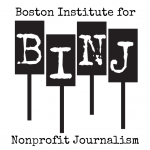The Boston Institute for Nonprofit Journalism was launched in 2015 to support the development and production of independent news in Massachusetts. From the outset, BINJ has fulfilled that mission by producing bold reporting on critical issues of the day, running collaborations with other news organizations, and training promising media makers. Work that we have done and will continue to do in support of the idea that a strong democracy requires a strong independent press—and that journalists like ourselves have to do our part to reverse the ongoing destruction of local news organizations nationwide by hedge funds masquerading as media companies if our democracy is going to survive and thrive in the decades to come.
Our 501(c)3 tax-deductible nonprofit has been led from the beginning by professional journalists in close cooperation with local news organizations around the Bay State and more than 100 freelance journalists.
Over the years, we have published dozens of significant investigative news articles on major underreported issues—and hundreds of articles of all types overall—and distributed them to multiple independent news organizations around our state and nationwide.
Some of our best stories since January include:
- Kraft Group Among Businesses Selling PPE to Mass w/ No Bid Contracts by Dan Atkinson
- Data Analysis and Report: The Coronavirus Crisis in Massachusetts Long-Term Care Facilities by Nicole Aschoff and Pankaj Mehta
- 500 Mass Properties, 20 Delaware Addresses, and One Costly Loophole by Hassan Ghanny
We also ran our popular Manchester Divided newsroom and wire for independent press covering the New Hampshire primaries for our second presidential election running in February. Our resources provided a base of operations for independent journalists and small news outlets locked out of the convention center housing major media, and resulted in 30-plus hard-hitting articles—developed using an engagement-driven citizens agenda—being disseminated internationally at the start of this election season.
Our production of independent news and views only accelerated at the start of the coronavirus pandemic, when we launched the Pandemic Democracy Project to produce shorter-form breaking journalism on the local effects of the global crisis in addition to the enterprise reporting we have become known for.
But the longer-term expansion of our core mission came a year previous with the founding of the Somerville News Garden project in June 2019 in response to the rolling (and now accelerating) collapse of the local news industry in Massachusetts—and our understanding that we had to experiment with ways to stop the Commonwealth’s cities and towns from becoming news deserts (municipalities with no professionally-produced news outlets). Starting with one small diverse city, Somerville.
The news garden’s three volunteer-driven initiatives made significant progress in 2020: the Neighborhood Media School launched online in June and taught basic journalism and media literacy skills to dozens of working adults in and around Somerville, the Somerville Wire that will feature articles of community interest written by people we train at the school plus our crew of professional journalists launches this month in coordination with the Emerson College journalism department and Somerville Media Center, and our Research Group has been conducting one-on-one interviews with the city’s nonprofit, government, labor, cultural, and religious leaders and distributing a survey to its population at large to determine the best plan of action to help Somervillians to rebuild their swift-disappearing news apparatus.
Our mission was further expanded by our legislative work on a key bill—currently on the verge of passage—aimed at getting a journalism commission established by the Massachusetts legislature to examine the crisis in local news and make recommendations for positive intervention by state and local governments. We partnered with several key legislators, the national media nonprofit Free Press and an array of news publishers, journalists, journalism educators, journalism students, and journalism consumers to move this bill forward. And we have plans to file new bills to help rebuild the local news ecology in Massachusetts in the next legislative session.
In our first five years, BINJ has done a great deal of useful work with limited resources. With your help we can build a bigger, stronger, more effective organization over the next five years that helps improve local news coverage across the Bay State—and the fortunes of the local news industry in the bargain.
We’re funded with grants from the Reva and David Logan Foundation, the Democracy Fund, Craig Newmark Philanthropies, the Google News Initiative, and the Solutions Journalism Network, plus donations by hundreds of people from around Massachusetts and beyond.
We encourage you to join the ranks of our many donors—or renew your commitment to independent journalism if you’ve donated to us in the past.
There are several ways to support BINJ this Giving Tuesday. Some are obvious, some less so.
First, you can click here to make a donation on our website. Monthly donations are great, but annual donations are also much appreciated.
Second, you can write us a check in any amount made out to Boston Institute for Nonprofit Journalism and sent to: BINJ, PO Box 51583, Boston, MA 02205.
Third, you can email us at info@binjonline.org and arrange to donate stock shares to BINJ.
Fourth, (and here we’re cribbing from Radcliffe’s Giving Tuesday email), the CARES Act, which was passed in March in response to the COVID-19 pandemic, includes unique measures to encourage philanthropy to nonprofit institutions like BINJ. Here are three important benefits that expire after December 31, 2020:
- Individuals who take the standard deduction on their federal tax returns can deduct up to $300 in charitable cash contributions from their income. (Typically no deduction is allowed.)
- Those who itemize can claim an income tax deduction for charitable cash contributions of up to 100% of adjusted gross income (up from 60%).
- Corporations can claim an income tax deduction for charitable cash contributions of up to 25% of their taxable income (up from 10%).
If any of these CARES benefits apply to you, and you have questions about how to use one or more of them to donate to BINJ, please email us at info@binjonline.org for assistance.
Fifth, and finally, if you are over 70 ½ years old and would like to make a Qualified Charitable Distribution to BINJ from the annual Required Minimum Distribution of your IRA account (understanding that RMDs have been waived by the CARES Act for most taxpayers this year but that you can still direct up to $100,000 from your IRA to charities like us in a tax efficient manner), please email us at info@binjonline.org. And definitely contact us if you have any questions about this type of donation.
Thanks to everyone who has received this email for any support you can give us in these difficult times. Even if you can’t afford to help us out this year, we’re committed to continuing to push back against the tide destroying local news organizations from within and without in Massachusetts until it stops. Producing the best investigative reportage of our state that we can as we go.
Here’s hoping for a decent conclusion to 2020 and a swift end to the terrible coronavirus pandemic.
Our very best regards,
Chris Faraone, Editorial Director
Jason Pramas, Executive Director
Boston Institute for Nonprofit Journalism











